| Srl | Item |
| 1 |
ID:
072236
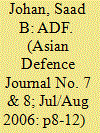

|
|
|
| 2 |
ID:
090078
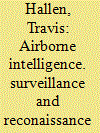

|
|
|
|
|
| Publication |
Canberra, Air Power Development Centre, 2009.
|
| Description |
xxii, 84p.
|
| Standard Number |
9781920800444
|
|
|
|
|
|
|
|
|
|
|
|
Copies: C:1/I:0,R:0,Q:0
Circulation
| Accession# | Call# | Current Location | Status | Policy | Location |
| 054365 | 358.4134320994/HAL 054365 | Main | On Shelf | General | |
|
|
|
|
| 3 |
ID:
121677
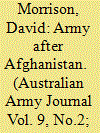

|
|
|
|
|
| Publication |
2012.
|
| Summary/Abstract |
I
t is an honour to address the Sydney Institute. Over more than two decades
Gerard and Anne have cemented the reputation of the Sydney Institute as the
premier forum in this city for the serious discussion of public policy as well as
the arts and culture. Theirs is a considerable achievement, and I am grateful for the
opportunity to deliver my first address to an audience outside Defence as the Chief
of the Army at this Institute. My topic today is the 'Army After Afghanistan.'
|
|
|
|
|
|
|
|
|
|
|
|
|
|
|
|
| 4 |
ID:
142026


|
|
|
|
|
| Summary/Abstract |
This paper analyses the response by the Australian political–military establishment to climate change through the lens of securitization theory. The research used mixed content analysis techniques to systematically examine more than 1500 speech-acts, policies and doctrinal articles between 2003 and 2013. It argues that the Australian Defence Force (ADF) was not a climate securitizing actor and that its response to climate change was mediated by the political partisanship surrounding broader national policy debates on climate change. The politicization of climate change made it increasingly difficult for the ADF to publicly adopt meaningful climate policies. It subsequently crafted a strategy that minimized any investment (resource or reputational) lest a change of government rendered them invalid or it drew unwanted criticism. At the very heart of this finding exists the challenge of an avowedly apolitical institution responding to what emerged in the Australian context as a politically partisan security issue. The more serious indictment concerned how national security policy (in the context of climate change as a security issue) became hostage to the politics of climate change.
|
|
|
|
|
|
|
|
|
|
|
|
|
|
|
|
| 5 |
ID:
143920
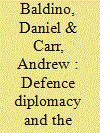

|
|
|
|
|
| Summary/Abstract |
The practice of military-to-military engagement has been strongly embraced in the last few decades as a central tool for strategic management. Many governments in the Asia-Pacific, including Australia, have accepted the practice as an instrument of statecraft to achieve comprehensive strategic outcomes: as a means of defusing tensions, reducing hostility and shaping the behaviour of states towards each other. This article examines Australia's broad approach and practice, and argues that such transformative ambitions are overstated. The evidence suggests that the benefits from defence diplomacy are evident at the tactical and operational level. It is a mode to deal with precise and immediate security issues, as opposed to the moulding of major strategic settings. This indicates the need to better recognise the limitations and conceptual flaws of defence diplomacy, and to reformulate Australian defence channels and related engagement prescriptions towards a more cautious, pragmatic and ultimately security-related stance. Through the use of case-study analysis, this research identifies both opportunities and constraints in conducting defence diplomacy, while offering guidelines for its future implementation in the region.
|
|
|
|
|
|
|
|
|
|
|
|
|
|
|
|
| 6 |
ID:
121670
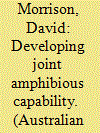

|
|
|
|
|
| Publication |
2012.
|
| Summary/Abstract |
The following is the text of an address given by the Chief of Army, Lieutenant General
David Morrison, to the Royal Australian Navy's Sea Power Conference in Sydney on 31
January 2012. Lieutenant General Morrison stated that the introduction into the Australian
Defence Force of new amphibious capability is anything but routine. The Landing Helicopter
Docks cannot be thought of as merely a transport capability. Rather they are an integral part
of a combat system with unique, and unprecedented, command and control and sustainment challenges. The acquisition of the Landing Helicopter Docks represents not only far
greater technical complexity in the operating systems than the Australian Defence Force has
previously experienced, but will introduce a far greater complexity into the joint training,
scheduling and integration across and between services. All parts of Defence activity are
going to be affected and will need to adjust. The Army is up for this challenge. The future
generations of Army officers will be trained and exposed to amphibious operations from the
outset of their careers, as a central pillar to how we fight. This will require an agile and joint
mindset that we cannot claim to possess across the entire force at present.
|
|
|
|
|
|
|
|
|
|
|
|
|
|
|
|
| 7 |
ID:
091705


|
|
|
| 8 |
ID:
073481
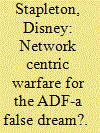

|
|
|
| 9 |
ID:
091127
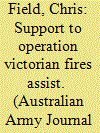

|
|
|
|
|
| Publication |
2009.
|
| Summary/Abstract |
The Victorian bush fires of February 2009 swiftly destroyed nearly two thousand homes and took over 170 lives. Yet, equally as swift, and in spite of the extensive damage, the ADF responded quickly and efficiently to this disaster with Operation VICTORIAN FIRES ASSIST. While the success of this operation was obvious for all to see, the author identifies several lessons that can be drawn from this unique experience, examining what worked as well as what did not-and how matters could be improved. To this end, the author offers a number of practical and innovative suggestions for how the ADF can better utilise its mix of contractor and military provided base services to better support ongoing warfighting tasks while mounting an equally effective response to similar contingencies in future.
|
|
|
|
|
|
|
|
|
|
|
|
|
|
|
|
| 10 |
ID:
127387
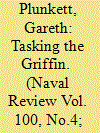

|
|
|
| 11 |
ID:
123941
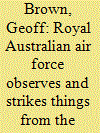

|
|
|
|
|
| Publication |
2013.
|
| Summary/Abstract |
The article reports on the Royal Australian Air Force's (RAAF) role in national security. According to the author, the factors that define the role of the RAAF in Australia's security include the national security strategy, the enduring roles of air power and the level of capability available to execute these functions. He explains that the Australian Defence Force's (ADF) maritime strategy is predicated on understanding and shaping the environment where the nation's national interests lie. INSET: Air Marshal Geoff Brown, AO.
|
|
|
|
|
|
|
|
|
|
|
|
|
|
|
|
| 12 |
ID:
104083
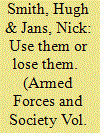

|
|
|
|
|
| Publication |
2011.
|
| Summary/Abstract |
This article reviews the history of military reserves in Australia with particular reference to the Army Reserve. It shows how the importance of reserves in Australia has waxed and waned across the past two centuries, from an early situation of primacy in the colonial period. The importance of reserves has reemerged in the post-Cold War era, with new forms of reserve organization evolving alongside ''conventional'' reserve forces. The authors discuss the extent to which these developments need to be accompanied by attention to cultural and personnel management issues and to enhanced reserves-regular integration. Despite the challenge of juggling civilian employment with reserve commitments, most reservists appear to welcome a greater, rather than a token, obligation to serve. There is a viable and meaningful role for the reserves provided that the Australian Defence Force and the government are prepared to devote sufficient effort to them and to assign them appropriate tasks.
|
|
|
|
|
|
|
|
|
|
|
|
|
|
|
|
| 13 |
ID:
156457
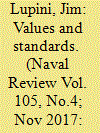

|
|
|